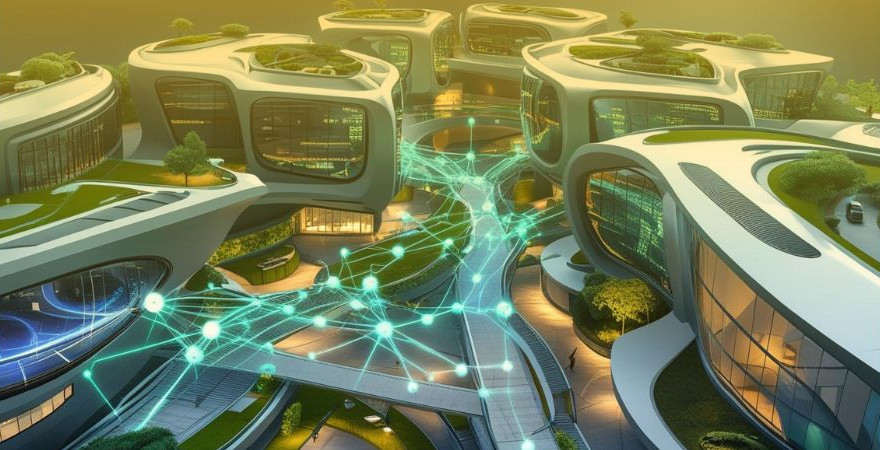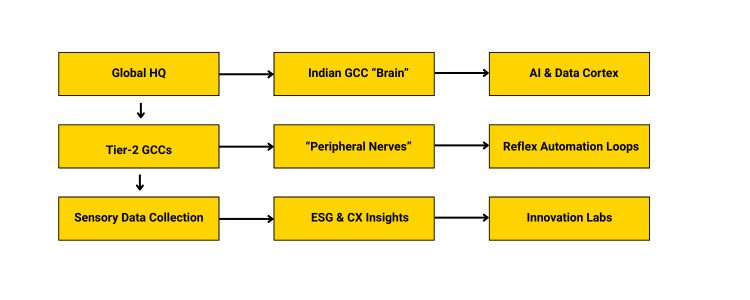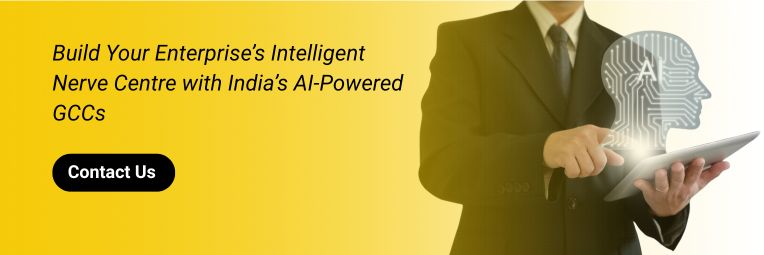
The Central Nervous System (CNS) strengthens the tendency of human intelligence, awareness, and survival. Without the brain and its nerve network, the body is unable to sense, decide, or function. Similarly, in the future professional world, the global capability center (GCC) will become the CNS of global enterprises, which will control decisions, tasks, and innovations. By 2030, business will depend on its India-based GCC for thinking, sensing, and response—in the same way the brain controls the human body. India, which is already hosting more than 1,900 GCCs and contributing $64 billion annually, is developing from a service outsourcing center into a wise nerve center of global corporations. With more than 2 million digital workers, with expansion in Tier-2 cities and offering 30–40% operating savings, there is a digital transformation in the GCC where corporate brains, awareness systems, and sensory data networks are being created. Just as neurons connect the human body, similarly the AI in global capability centers (GCC) in India will connect global enterprises to their future.
➡Enterprise-wide predictive analytics ➡24/7 distributed talent hubs ➡Automated corrective process adjustments ➡Customer sentiment analysis ➡Digital twin-based product innovation
In future enterprises, GCC will act as corporate brains, take strategic decisions, and enable intelligence-based operation through the following: About 70% of Fortune 2000 companies use their global capability in India not only for operating functions but also for strategic functions. By combining AI in global capability centers and domain expertise, these GCCs become digital brains, thinking, predicting, and implementing.
Small cities of India are becoming important centers in global distribution networks: These cities play a role as “peripheral nerves,” offering local knowledge plus execution capabilities that improve agility as well as measurement for global enterprises.
AI-run GCC works like reflex mechanisms that make sure operational agility and risk management are in place. By 2030, 60% of GCC processes will be autonomous. Enterprises can now respond rapidly, reduce downtime, and improve flexibility.
Today GCCs are not only working as innovation centers but also collecting environmental and social data in real time, supporting the global ESG goals. Also, they monitor the customer response cycles and shape the following: The GCCs become the “sensor” of the commercial world, which empowers human-focused and planetary development strategies.
GCCs as innovation centers will become the cortex of the brain and enter the enterprise development through: They carry forward the next generation of products and services. According to data, innovation-based GCC enterprises launch 40% faster than the competitors.
By 2030, India’s global capability center will serve as intelligent nervous networks of enterprises, which will empower innovation, strategy, stability, and operational speed. Businesses investing in AI-operated GCC in India will get agility, flexibility, and long-term competitive benefits.
To create an AI-International innovative Global capability centers in India, partner with your reliable promoter, Inductus GCC. From digital changes to automation and innovation laboratories, we help in making global enterprises such intelligent nervous centers that promote development, flexibility, and future preparations—from India’s results from the GCC ecosystem.
Just as the human nervous system controls the body, similarly modern GCCs manage strategic decisions, automation-based operations, and real-time data analysis for global enterprises. India provides access to more than 2 million digital professionals, 30–40% operational savings, world-class digital infrastructure, and talent centers in Tier-2 cities. The role within the AI in GCC strengthens the dashboard, process automation, forecasting analysis, and research and development, making them strategic, self-teaching centers for enterprises. No. GCC today manages business-mating tasks such as innovation laboratories, product research and development, compliance monitoring, ESG reporting, and digital customer experience operations. By 2030, the GCCs will develop completely as the AI-manual enterprise core, and the healthy operation will promote acute innovation and serve as the digital nervous system of global corporations. Aditi, with a strong background in forensic science and biotechnology, brings an innovative scientific perspective to her work. Her expertise spans research, analytics, and strategic advisory in consulting and GCC environments. She has published numerous research papers and articles. A versatile writer in both technical and creative domains, Aditi excels at translating complex subjects into compelling insights. Which she aligns seamlessly with consulting, advisory domain, and GCC operations. Her ability to bridge science, business, and storytelling positions her as a strategic thinker who can drive data-informed decision-making.
A Neural Blueprint in the Future Enterprises
Neural Role
Function
Key Activities
Expected Impact by 2030
Business Benefits
Corporate Brain (CNS)
Strategic thinking & decision hub
➡AI-powered business intelligence dashboards
70% of Fortune 2000 firms are using India GCCs as core brains.
Faster decisions, enterprise intelligence
Peripheral Nerves
Distributed execution network
➡Tier-2/3 city expansions
40% of GCC capacity in Tier-2/3 cities
Scalability, resilience, cost efficiency
Reflex Arcs
Automation-led responses
➡ Real-time incident detection using AI
60% of processes autonomously managed
Real-time agility, risk reduction
Sensory Intelligence
ESG & customer feedback systems
➡Real-time ESG data tracking dashboards
80% ESG & CX monitoring via GCC platforms
Sustainable, customer-centric growth
Cognitive Cortex (Innovation)
R&D and innovation driver
➡AI and machine learning development labs
40% faster time-to-market on innovations
Accelerated innovation, competitive edge
Corporate Brain: GCC as Cognitive Command Centre
Peripheral Nervous System: Extension of Tier-2 and Tier-3 Cities
Reflex Arcs: Leveraging Automation to Accelerate Response
Sensory Data Intelligence: ESG and Customer Focus
Cognitive Cortex: Innovation and Future Thinking

Conclusion
frequently asked questions (FAQs)

Aditi
Hey, like this? Why not share it with a buddy?
Related Posts
Recent Blog / Post
- Agile Methodologies for GCCs: A Blueprint for Success October 6, 2025
- The Legal and Compliance Checklist for a New GCC Setup October 4, 2025
- The Rise of Niche GCCs: A Focus on Specialised Capabilities October 4, 2025
- The Impact of Regulatory Changes on GCC Operations October 4, 2025
- Cybersecurity for GCCs: A Proactive Approach to Data Protection September 30, 2025
- Beyond Cost: Measuring the True ROI of Your GCC Investment September 29, 2025
- The Future of GCCs in the Retail Sector: A Strategic Playbook September 29, 2025
- David vs Goliath: Mid-Sized GCCs Quietly Outperform the Big Brands September 29, 2025
- Infineon’s Big Bet on India: Inside Its First GCC in GIFT City September 29, 2025
- From Campuses to Capability Centres: How Indian Universities Power the Global GCC Ecosystem September 29, 2025
- Retail Meets Digital: Costco’s GCC in Hyderabad Marks a Global Shift September 29, 2025
- The Silent Crisis: Why Many GCCs Plateau After 3 Years and How to Avoid It September 24, 2025
- Germany’s New Skilled Immigration Act and Its Ripple Effect on the GCC Talent Model September 24, 2025
- From Tokyo to Hyderabad: The Future of GCCs for Japanese Conglomerates September 23, 2025
- GCCs as AI Acceleration Hubs: Collaborating with US and Nordic Tech Majors September 19, 2025
















